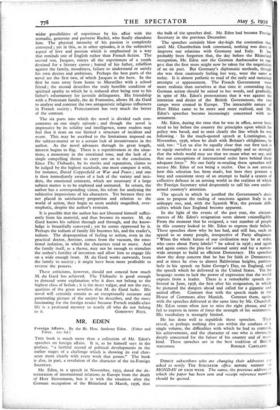MR. EDEN
Foreign Affairs. By the Rt. Hon. Anthony Eden. (Faber and Faber. 12s. 6d.)
Tins book is much more than a collection of Mr. Eden's speeches on foreign affairs. It is, as he himself says in the vreface, "a faithful record of political developments in the earlier stages of a challenge which is showing its real char- acter more clearly with every week that passes." The book is also, in part, a revelation of the character of the ex-Foreign Secretary.
Mr. Eden, in a speech in November, 1933, dated the de- terioration of international relations in Europe from the death of Herr Stresemann, but it is with the situation after the German occupation of the Rhineland in March, 1936, that the bulk of the speeches deal. Mr. Eden had become Foreign Secretary in the previous December.
The speeches certainly blow sky-high the contention that, until Mr. Chamberlain took command, nothing was done to improve our relations with Germany and Italy. It has probably been forgotten that, the day before the Rhineland occupation, Mr. Eden saw the German Ambassador to sag_ ge,,t that the first steps might now be taken for the negotiation of an air pact. But Germany's diplomatic methods, though she was then cautiously feeling her way, were the same as today. It is almost pathetic to read of the early and sustained attempts at appeasement. The French Government were more realistic than ourselves at that time in contending that German action should be suited to her words, and gradually, in spite of Mr. Eden's protestations that it was against the intention and desire of the British Government, the two camps were created in Europe. The intractable nature of Herr Hitler came to be more and more realised, and Mr. Eden's speeches become increasingly concerned with re- armament.
Mr. Eden, during the time that he was in office, never hesi- tated to lay before the country the principles upon which his policy was based, and to state clearly the line which he was following.. In the much-quoted speech at Leamington, in November, 1936, when he dealt with Britain's obliglations, he said, too : " Let us also be equally clear that our first task is to equip ourselves as a nation so thoroughly and so strongly that the whole world may see that we mean what we say, and that our conceptions of international order have behind them adequate force." No one fairly re-reading these speeches will accuse Mr. Eden of not being a realist. One is not certain how this selection has been made, but here they present a long and consistent story of an attempt to build a system of collective defence in an arming world to the realities of which the Foreign Secretary tried desperately to call his own under- armed country's attention.
The speech in which he justified the Government's deci- sion to propose the ending of sanctions against Italy is an unhappy one, and, with the Spanish War, the present diffi- culties which face England become apparent.
In the light of the events of the past year, the circum- stances of Mr. Eden's resignation seem almost unintelligible. From the moment that he resigned, a vast number of people in tliis country looked to Mr. Eden to express their beliefs. These speeches show why he has had, and still has, such an appeal to so many people, irrespective of Party allegiance. " When the whole future of our civilisation may be at stake, who cares about Party labels? " he asked in 1936 ; and again and again comes the plea for national unity and for a nation- wide attempt to build an efficient Democracy. His speeches show the deep concern that he has for faith in Democracy, and at times he rises to almost Baldwinian heights, particu- larly in his speech on Saint George's Day, on England, and the speech which he delivered in the United States. Yet his language seems to lack the power of expression that the world expects from a leader. There is a remarkable speech de- livered in June, 1938, the first after his resignation, in which he pictured the dangers ahead and called for a gigantic and united effort. Contrast that with the speech made in the House of Commons after Munich. Contrast them, again, with the speeches delivered at the same time by Mr. Churchill. Mr. Eckn seems often just to miss the right phrase, and to fail to express in terms of force the strength of his sentiments. His vocabulary is strangely limited.
He has done well to republish these speeches. They reveal, as perhaps nothing else can within the confines of a single volume, the difficulties with which he had to contend, his achievements, and the character of one who is obviously deeply concerned for the future of his country and of man- kind. These speeches are in the best tradition of Briti














































 Previous page
Previous page